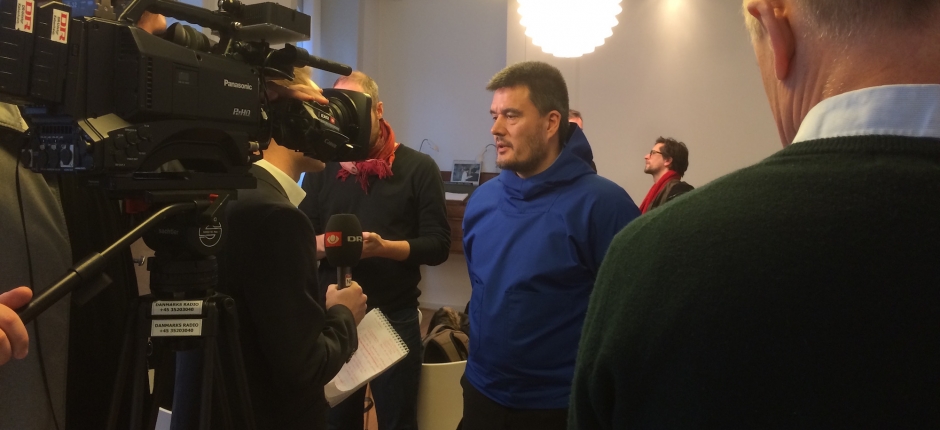In Greenland, voters hope election is nothing fishy
As Greenland’s lawmakers prepare to hit the campaign trail, voters are hoping they leave the political baggage behind.

The formalities are not in place yet: Neither a date nor a formal list of candidates for Greenland’s general election have been set. Both are expected to be finalized next week.
Campaigning, however, had begun even before Kim Kielsen, the premier, announced on Monday that he was cancelling the spring session of Inatsisartut, the national assembly, and holding an election seven months ahead of the Nov. 28 deadline.
Among lawmakers, a fisheries reform is the main bone of contention. Neither of the two big parties that made up the coalition government agreed on how to go about doing it, and insiders suggest this, as much as Kielsen’s stated reason of seeking to avoid pre-election gridlock during the spring session, is what precipitated his decision.
In short, the reform calls for redistributing quotas. Siumut, Kielsen’s party, and Partii Naleraq, a third party in the government, support the reform that, in essence, would allow more people to fish and more fish to be caught, but might end up reducing the amount of revenue the Self-Rule Authority takes in.
[Facing gridlock, Greenland’s premier calls early election]
IA, the second-largest party in the government, is worried the reform isn’t sustainable, and that it’s just not clear what the impact will be in general. Since fishing makes up close to 90 percent of Greenland’s exports, the party is leery of doing any anything that affects it unless it is thought through carefully.
“It’s important that we make sure that when we change something as fundamental as the way we issue quotas that we include everyone involved in the decision in order to avoid unnecessary instability in the country’s most important industry,” Sara Olsvig, the party’s leader, told KNR, a broadcaster.
If, however, the informal online poll taken by Sermitsiaq.AG, a news outlet, can be used as a guideline, the fisheries reform is of little consequence to voters; it places second to last among six selected topics. Education and housing top the list.
Paying attention to what voters’ want will likely play a decisive role in determining the election’s outcome: In the 2014 vote, just 326 votes, or about 1 percent of all ballots cast, separated Siumut and IA, and both can point to significant achievements during the past four years.
Tops on Siumut’s list of accomplishments is that it secured passage of a plan to build three new airports and improve others, even if funding for the 4 billion kroner ($510 million) project remains uncertain. It can also claim that the country’s mining industry restarted on its watch.
[Greenland premier calls for inclusivity ahead of general election]
IA will suggest that a challenge to Kielsen’s leadership in 2017 by Vittus Qujaukitsoq, a former foreign minister, is a sign of a party in turmoil. After sitting in opposition until October 2016, IA was invited into the government, and has since held key cabinet positions. This, the party will argue, means it is capable of governing, yet prepared to compromise when it is needed.
Sermitsiaq.AG’s poll places independence from Denmark, often the noisiest topic in political discussions, dead last, ahead of only “undecided.” While most candidates are likely to agree — in part because there is broad consensus that independence should happen, though not right away — it may still be a topic they are forced to address.
This is because Qujaukitsoq, a member of the cabinet until last April and a strident supporter of a quick break, is hoping he can register a new party in time for the election. If it enters the race, the party will campaign on an independence platform, he has said.
Greenland does not control its own foreign affairs, but that does not mean they will be absent from the election entirely. Most important is the country’s relationship to the U.S. and the deal that allows Washington to use land in the far northern part of the country for an airbase, with no requirement that it compensate Nuuk or Copenhagen.
[Shakeup at Greenland’s foreign ministry continues]
This is an arrangement Qujaukitsoq, as foreign minister, pushed hard to change, though neither he nor his successor have been able to make progress with their demands.
Of more immediate concern may be Russia, and whether it will seek to influence the election in the same manner it is suspected of doing elsewhere in the West. Addressing the issue recently, Claus Hjort Frederiksen, the Danish defence minister, warned Moscow may seek to disrupt Greenland’s vote by spreading false news stories about its relationship with Denmark.
Academics following Greenland agree fake news might pop up, particularly because social media is widely used in Greenland. Still, they reckon that, even if it is another close race, it has little potential to impact the outcome.
Even so, voters will still hope the election is nothing fishy.